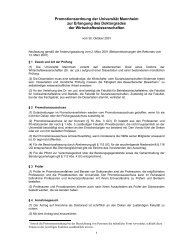The returns to cognitive and non-cognitive abilities in Germany
The returns to cognitive and non-cognitive abilities in Germany
The returns to cognitive and non-cognitive abilities in Germany
Create successful ePaper yourself
Turn your PDF publications into a flip-book with our unique Google optimized e-Paper software.
Substantially, the results <strong>in</strong>dicate that some of our a priori expectations are met while<br />
others are not <strong>in</strong> l<strong>in</strong>e with our hypotheses or previous f<strong>in</strong>d<strong>in</strong>gs. We <strong>in</strong> particular suggested<br />
that both openness <strong>and</strong> conscientiousness would be positively related <strong>to</strong> earn<strong>in</strong>gs. While<br />
there are wage premiums for females of about 2% <strong>in</strong> the OLS regressions <strong>to</strong> about 6% <strong>in</strong> the<br />
EIV models for a one st<strong>and</strong>ard deviation <strong>in</strong>crease <strong>in</strong> openness, the coefficients <strong>in</strong>dicate a<br />
wage penalty of 2% <strong>to</strong> 4% for males. This is <strong>in</strong> contrast <strong>to</strong> the results of Mueller <strong>and</strong> Plug<br />
(2006). However, note aga<strong>in</strong> that the theoretical conjectures from the psychology literature<br />
allow for a negative effect on labor market success s<strong>in</strong>ce openness is l<strong>in</strong>ked <strong>to</strong> au<strong>to</strong>nomy <strong>and</strong><br />
<strong>non</strong>-conformity (Judge et al., 1999). Another difference by gender is found for<br />
conscientiousness. <strong>The</strong> coefficients <strong>in</strong>dicate a wage penalty for female workers but they are<br />
not statistically significant. Men on the other h<strong>and</strong> seem <strong>to</strong> ga<strong>in</strong> from conscientiousness<br />
which is <strong>in</strong> l<strong>in</strong>e with our expectations. <strong>The</strong>re is a wage premium of about 1.5% for a one<br />
st<strong>and</strong>ard deviation <strong>in</strong>crease <strong>in</strong> conscientiousness.<br />
<strong>The</strong>re is also mixed evidence by gender with respect <strong>to</strong> extraversion. We f<strong>in</strong>d a<br />
negative wage differential of almost 4% for women but a 3% wage premium for males for a<br />
one st<strong>and</strong>ard deviation <strong>in</strong>crease <strong>in</strong> extraversion (Table 1, columns 2 <strong>and</strong> 4). Based on prior<br />
evidence, our expectation was that extraversion would not be related <strong>to</strong> wages but note aga<strong>in</strong><br />
that theoretical reason<strong>in</strong>g from the psychology literature allows for both positive <strong>and</strong><br />
negative effects on job performance (Judge et al., 1999).<br />
Agreeableness is not associated with males’ wages <strong>in</strong> the error-correction model but<br />
negatively related <strong>to</strong> females’ wages. <strong>The</strong> po<strong>in</strong>t estimates <strong>in</strong> the full specifications suggest<br />
for a wage penalty of 3% for ‘be<strong>in</strong>g nice’, i.e. a one st<strong>and</strong>ard deviation <strong>in</strong>crease <strong>in</strong><br />
agreeableness, which even <strong>in</strong>creases <strong>to</strong> almost 7 % <strong>in</strong> the EIV regression (Table 1, columns<br />
1 <strong>and</strong> 2). While this may seem implausible at first glance it is consistent with theoretical<br />
arguments above <strong>and</strong> with previous research (cf. Nyhus <strong>and</strong> Pons, 2005, or Mueller <strong>and</strong><br />
20















